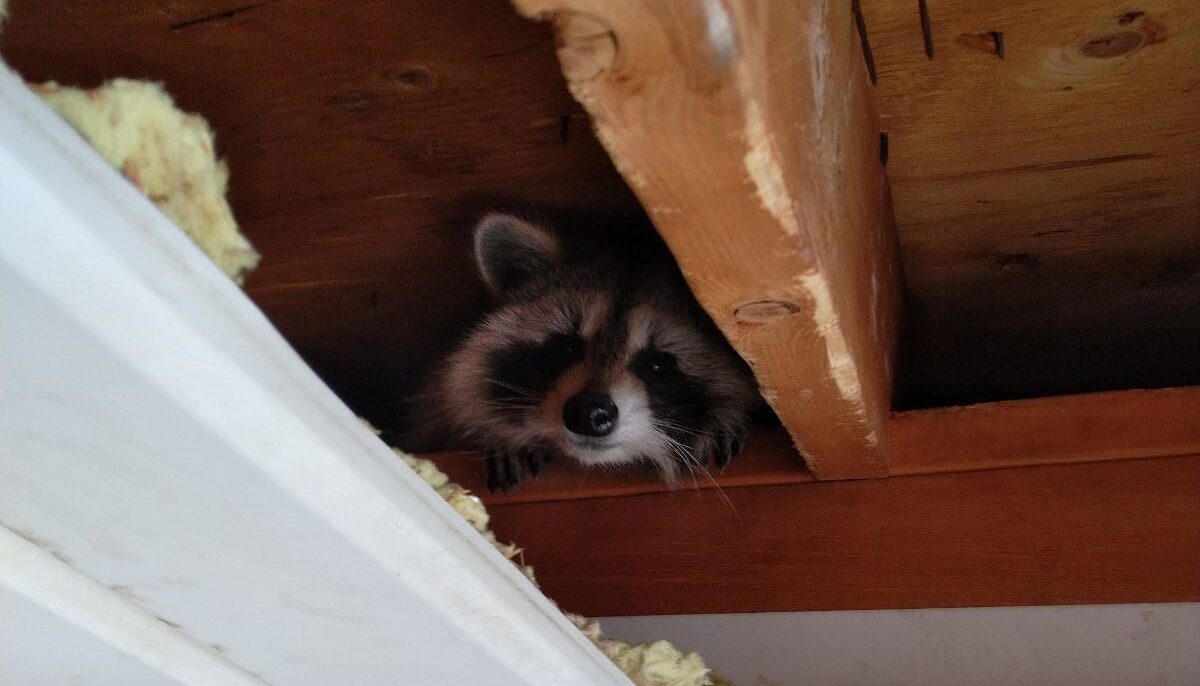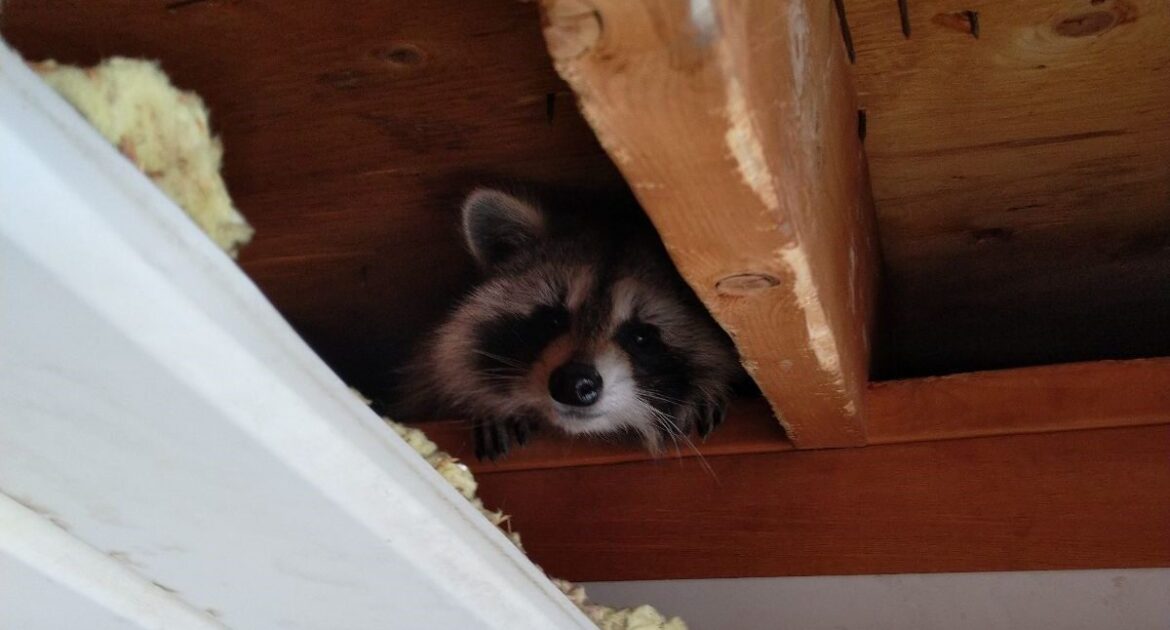If you’ve found a raccoon in your home, you’re not alone. These smart and resourceful animals often sneak into homes looking for food or shelter. Dealing with them safely is important to protect your family and avoid further issues.
This guide offers clear advice on handling raccoon encounters, from safe removal tips to effective deterrent strategies. Learn how to keep your home secure and your family safe from unwanted visitors.
Why Taking Action Quickly Matters
Discovering a raccoon in your home can be unsettling, but acting quickly is essential. Raccoons are more than just unwelcome guests—they can cause significant damage to your property and pose serious health risks.
Taking swift action can save you from costly repairs and protect your household from potential dangers.
- Property Damage: Raccoons can tear through shingles, soffits, and vents to access attics or chimneys, leaving your home vulnerable to further damage.
- Interior Destruction: Once inside, they may rip apart insulation, chew through electrical wiring, and leave waste that creates hazardous conditions.
- Health Risks: Raccoon feces can carry diseases like leptospirosis, salmonella, and Baylisascaris roundworm, which pose serious health risks to humans.
- Rabies Threat: Raccoons are known carriers of rabies, which can be transmitted through bites or scratches, endangering both humans and pets.
- Escalating Issues: Early signs like scurrying noises, droppings, or damaged vents can quickly evolve into larger, more expensive problems if left unaddressed.
Taking quick, informed action is critical to protecting your home and family. Always approach the situation with caution, as raccoons can become defensive, especially if they are caring for their young.
When in doubt, seek professional assistance to safely and effectively handle these unwelcome intruders.
Effective Raccoon Deterrent Strategies
Keeping raccoons out of your home should be a priority, especially if they’re common in your area. These animals are opportunists, so the easier it is for them to access your property, the more likely they’ll stick around. To prevent raccoons, focus on two key areas: removing attractants and securing entry points.
Start by eliminating attractants. Raccoons are scavengers and are often drawn to garbage bins. Use sturdy, animal-proof containers with tight lids, and don’t leave pet food outside. Clean up fallen fruit and keep outdoor areas tidy to reduce potential food sources.
Next, secure your home. Check vents, chimneys, soffits, and rooflines for damage or weak spots. Reinforce these areas with durable materials like steel mesh or heavy-duty screens. Install chimney caps and protect roof vents with reinforced covers. Also, trim tree branches near your roof to block raccoons from climbing onto your house.
While these steps can help, raccoons are persistent. If the problem continues, consulting a professional can ensure your home is secure in a humane and effective way.
Safe Raccoon Encounter Tips When Faced With an Intruder
Raccoon encounters can be unsettling, but staying calm and handling the situation carefully is key to resolving the issue safely. If you discover a raccoon in your attic, chimney, or elsewhere in your home, how you respond can make all the difference.
- Avoid close interaction: Raccoons can feel threatened in confined spaces, especially if babies are involved. Keep your distance and do not attempt to handle or approach the animal.
- Seal off the area: Block off doorways or corridors to prevent the raccoon from wandering further into your home. Make sure other occupants, especially children, stay away from the area.
- Call a wildlife professional: Never attempt to remove the raccoon yourself. Contact an expert who can safely and humanely handle the situation with the right tools and knowledge.
- Avoid loud noises: Stay quiet and avoid sudden movements to prevent further agitation. Observe the raccoon from a distance to provide helpful details to wildlife specialists, such as signs of nesting or baby raccoons.
By taking these steps and leaving the removal to trained professionals, you can ensure the safety of your household and the humane treatment of the animal. Preventive measures and timely action are vital in avoiding unnecessary risks. Trust the experts to help you handle the situation effectively and safely.
Why Professionals Make the Difference
At Skedaddle, we understand how important it is to protect your family and home. Our professional wildlife control services offer effective, humane, and permanent solutions to raccoon problems. Here’s how we handle it:
- We start with a full property assessment to understand the situation.
- Next, we identify how raccoons are entering your home and using your property, such as creating dens during baby season.
- We carefully remove all animals, ensuring every step is safe and humane.
Home security is a top priority, so we seal entry points and reinforce vulnerable areas to prevent future issues. Cleanup is another key step—raccoons often leave behind droppings, fur, and debris that can pose health risks. Our team uses professional tools to clean and disinfect the space, restoring safety and sanitation to your home.
Dealing with raccoons can be stressful, but at Skedaddle, we use our expertise to handle every step with care and precision, giving you peace of mind.
Protect Your Family Today
When dealing with wildlife on your property, preparation and timely action are key. By understanding safe raccoon encounter tips, employing effective raccoon deterrent strategies, and knowing how to act when raccoons gain access to your home, you’re safeguarding both your property and your loved ones.
If you’re facing any concerns about raccoons or want to better protect your home, Skedaddle is here to help. With years of experience and a commitment to humane practices, we specialize in providing solutions that work. Don’t leave the safety of your family to chance—get in touch with our team today. Together, we’ll ensure your home stays secure and peaceful.




